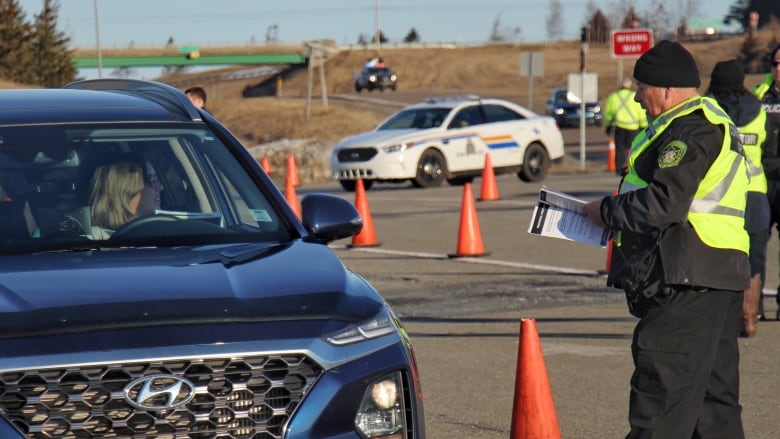Delays at N.S.-N.B. border becoming 'a bit of a problem,' says truck driver
Adam Stiles says holdup is worse to get into New Brunswick, but he's waited in lineups in both directions
Long lineups at provincial borders have been a defining feature of the new Atlantic bubble, and some say waiting to cross is more than just an inconvenience.
For truck driver Adam Stiles, it's getting in the way of business.
"This border delay is greatly affecting our productivity … and it's becoming a bit of a problem," said Stiles.
He spoke to CBC by phone Sunday afternoon, shortly after crossing into New Brunswick after waiting an hour and 15 minutes on Highway 104.
He had planned to return to Nova Scotia and continue his workday, but he said he could no longer fit in any more runs without exceeding the maximum number of hours truck drivers can legally spend behind the wheel.
Instead, he decided to cut his day short.
Stiles, who works as an independent contractor, crosses the Nova Scotia-New Brunswick border multiple times a day, six days a week, hauling petroleum.
The crossing doesn't usually slow him down, but that changed on Friday when tens of thousands of people started taking advantage of the Atlantic bubble.
Under the bubble, residents of the four Atlantic provinces don't have to self-isolate for 14 days after crossing provincial borders. Still, provincial officials are stopping non-commercial vehicles at checkpoints.

Crossing into New Brunswick, travellers have to prove their residency, provide contact information and fill out a health questionnaire. Crossing into Nova Scotia, travellers only have to show proof of residency.
Stiles said the delay is worse to get into New Brunswick, but he's waited in lineups in both directions. He also crossed on Friday, the first day of the bubble, and spent almost two hours waiting to get into New Brunswick in the early morning, and an hour waiting to get back into Nova Scotia.
He said he was better off than many of his colleagues who travelled later in the day and spent up to four hours waiting to cross in the afternoon.
Calling for a solution
"I'm hoping the governments will come together with a solution," said Stiles, who is a New Brunswick resident.
At the main highway crossing between Nova Scotia and New Brunswick there are lanes designated for commercial vehicles, like transport trucks, and essential workers, like health-care workers. But Stiles said those lanes have been blocked by the spike in bubble traffic.
"What happens is everyone ends up basically in a single lane, essential and non-essential traffic, until you get to the actual border point or within sight of it."
Stiles said some essential travellers are moving around traffic on shoulders, but he suspects that's creating confusion.
"It's because they cannot seem to divide the traffic far enough back as required to make it safe for the division of traffic."
PC MLA calls traffic jams a safety concern
Stiles isn't alone in voicing frustration with traffic backups on the Trans-Canada highway. Nova Scotia Progressive Conservative MLA Elizabeth Smith-McCrossin posted a video on Facebook Sunday with her own concerns.
The video shows traffic moving at a crawl in both directions near the border.
Smith-McCrossin isn't seen in the video but can be heard saying, "Even though our officials in both New Brunswick and Nova Scotia met Friday night to work on a solution, clearly, a solution was not found."
She posits that the lineups are unsafe because they could get in the way of emergency vehicles, and "not fair," for people sitting in their cars waiting to cross.

